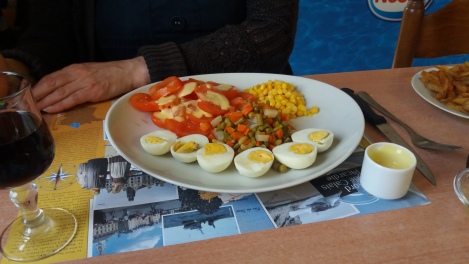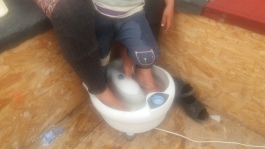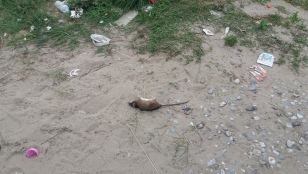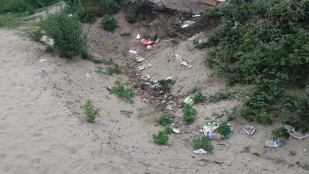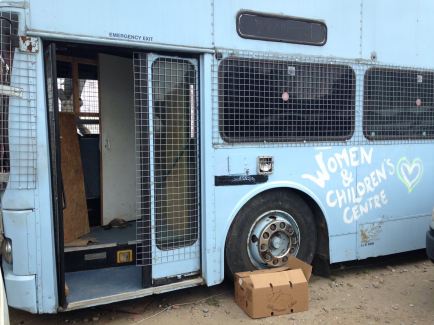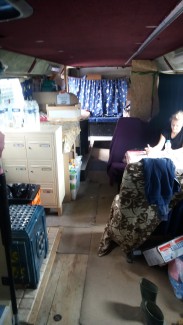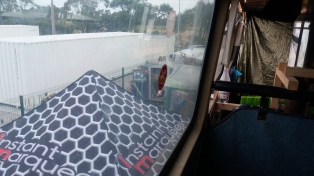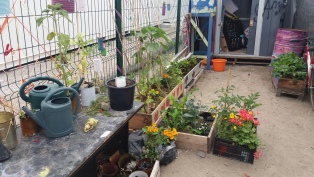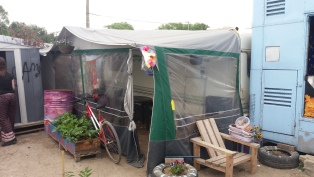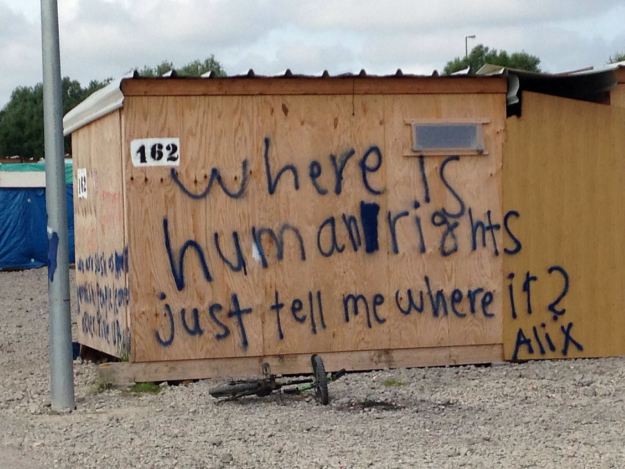
Grande Synthe and Calais: July eyewitness report and appeal for support
Grande Synthe and Calais, July 2016
As Caroline and I prepare for our latest trip, the news from Calais is pretty dire – few volunteers are at the warehouse and cold food distribution has had to be suspended because of a lack of funds, donations and people. Fortunately Sheffield Donations for Refugees have raised a tidy sum, and we receive donations and help from people through Unite, family and friends, for which we are very grateful. We bulk buy lots of food, as this seems to be the greatest need at the moment and once again Nico’s car is thoroughly rammed with donations.
Driving to and around Calais has become second nature now, we get to the warehouse in good time and unload. We arrange to meet with other volunteers next morning to go to the Medecins Sans Frontieres camp in Grande Synthe near Dunkirk. We’re glad to go there again, when we last visited in March the camp had only been set up a couple of weeks, and it will be good to see how things have progressed.
The Refugee Information Bus is on site, which gives advice and legal support to refugees in camp. We’ve brought them ten copies of the Right to Remain toolkit which have just been published, and stop for a chat. Unfortunately many refugees don’t want to hear the facts about how hard it will be for them if they make it to the UK and the intricacies of the asylum system, it’s a tough message to get across.
To save costs we’re staying on a campsite this time. Somehow we make ourselves understood to the campsite owner, despite our abysmal French, and soon we are putting our tent up in a gale. We decide to eat there tonight, even though the menu consists of two steak dishes and Caroline is vegetarian. The campsite owner offers to make up a salad for her, which turns out to be quite disgusting, then over-charges a scandalous amount for the meal. Definitely need to brush up on expressions of outrage in French if we’re coming here again.
Next morning we pack up the car with the items for distribution in Grande Synthe. Camp security is now organised by central rather than local government, and it’s a change for the worse. Previously the security was unobtrusive, but these guys seem to have modelled themselves on nightclub bouncers. They allow our vehicle in as it has boxes and bags for distribution but are refusing entry to other cars. One woman is there to collect furniture from the women and children’s centre to be moved elsewhere but they won’t let her on to get them, much to her frustration.
Our first job is the 12 o’clock men’s distribution, giving out items including socks, t-shirts and toiletries. The intention is to make it feel like a shopping experience with an element of choice, and there is much deliberation over sock selection. Two volunteers are outside advising what items are available, keeping an eye out for queue jumping, scuffles etc. But we’re not expecting any trouble, because we don’t have any shoes. Fights have broken out over shoes more than once – hardly surprising when people are walking around in sandals or in trainers with the backs broken down.
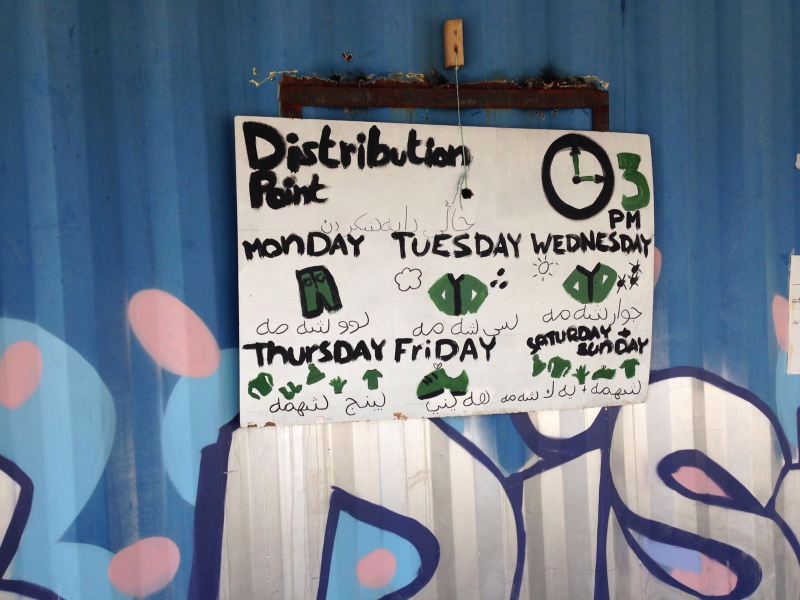
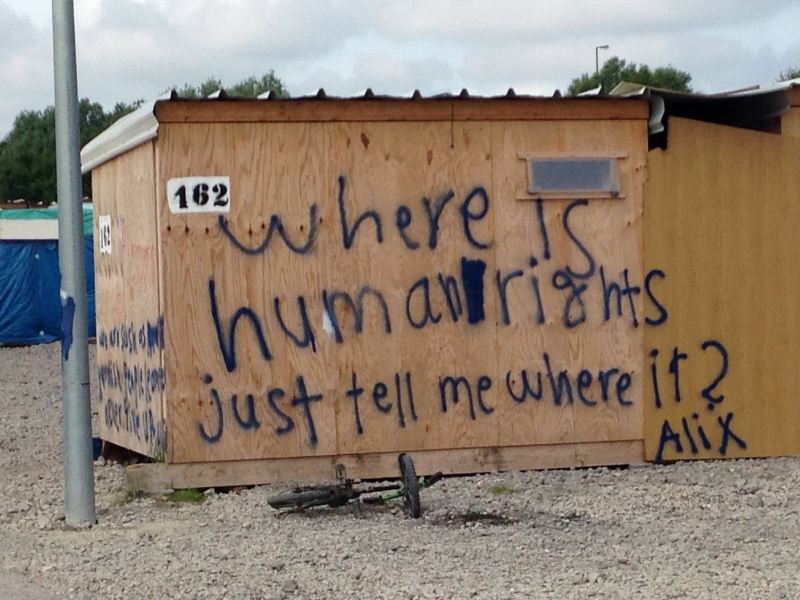

There are more than enough of us so I go and help the woman who needs to shift stuff off site, but as soon as I get in the car a refugee approaches to ask when I am going back to the UK. I explain it will be on Monday, and he asks if I could take some things over for him. I’m not entirely clear what and why he wants to move things, but take his phone number and agree to visit his shelter later to discuss.
The women and children’s centre has really come on since our last visit in March, it’s now screened off from view. It has an electricity supply, enabling people to charge mobile phones and use other equipment; and a row of wood-burning stoves so that the women can come and cook meals. The volunteers there are having a meeting, discussing what activities would be appealing for the women – there is so little for people to do here. Suggestions include massage, weaving and sewing sessions, though these are all dependent on having volunteers with the right skills and equipment. A boy of about 12 with very good English is translating the ideas to some of the women to get their approval.

The meeting over, as we put the chairs and table that need to go off site into the car, the refugee who wants me to take stuff to the UK comes by again, and turns out to be the father of the boy doing the translating; I am also introduced to his mother and younger siblings. In the car park we transfer the furniture to another vehicle, and then the over-officious security refuse to let the car back on site, although they can plainly see it is still loaded with items for the 3 pm distribution. I have to go and get the lead volunteer, but even then they refuse entry – there is no rhyme or reason to the rules, which appear to have changed since this morning. Eventually they let us on but tell us we must be off site again in three minutes. But they have no real interest in enforcing this, so we take our time unloading for the afternoon distribution.
We go for lunch, which is surprisingly tasty considering it consists only of rice and chickpeas, then Caroline and I go to visit the refugee family. We are warmly welcomed to their shelter, and given tea and biscuits while they explain the situation. The father has already lived and worked in the UK and has permission to stay, but can’t meet the financial requirement to get visas for his family. Clearly there is a cunning plan to get the family over, but whatever it is it won’t allow them to carry much luggage. We agree to take a large bag of the family’s clothes and shoes and a pushchair with us to drop off with their friend in England, then head off for the 3 pm distribution, which goes smoothly.
Loaded up with the family’s gear, we go back to the warehouse. We’re not that hungry but grab a bit of lentil curry anyway in case we don’t get another chance, because we’re definitely not eating at the campsite again. We do decide to have one drink there before heading out to another bar though, which also proves to be a mistake – when the campsite owner pours us two glasses of white wine, Caroline is appalled to see a dead bluebottle float to the top of one. The replacements he is forced to provide are warm and we make a mental note not to drink here again either.
At the other bar there is a hog roast, so Caroline is doomed to salad again, even the crudites are secreting bits of ham and fish. We manage a stilted conversation with some French holidaymakers, though it’s not until the end of the evening that one of them asks why we are there. He’s not very impressed when we explain what we are doing, though as guests we are appeasing – we understand that it is a difficult situation for French people in Calais as well, and it is a UK problem. He complains that the refugees get everything for free – clothes and food – which is partly true, but we explain that the clothes are old and the food is limited. Regardless it has been a pleasant enough evening and we decide to return there for the Euro 16 final the following evening.
We get to the warehouse early on Sunday – possibly a mistake as we are then lumbered with all the washing up from the previous day. I bump into one of the volunteers from the Calais women and children’s bus on our May trip, it’s her day off today and she needs another volunteer there, so our plans for the day are sorted.
At the bus the first thing we notice – they’re hard to avoid – are the dead rats littering the place, which look quite fresh except where they’ve been run over. At first we are concerned that there is some new disease around causing them to die, but later we are told that blocks of rat poison have been placed around the camp, so more likely they have eaten the poison and died on the way back to their nest in a sandy pit opposite the bus. Trying to ignore them, we put the day’s items for distribution on to the bus. It has been moved out a bit from the fence to the container area, to create a play area complete with a garden, shed, caravan and gazebo.
Today is cinema day and children start to arrive to watch Space Jam, while women come to collect the limited items we have – mainly baby wipes and nappies – and to sit down and chat for a while. Some of the women I met on my last visit, there has been little change for them in the meanwhile. An air conditioning unit and solar panels to power it have been provided, but no-one has had the time or knowledge to get them working, so as an interim measure the bus windows upstairs have been lined with reflective material and it’s more bearable in the heat.
Through her work Caroline has learnt a few words of Farsi and Arabic which she uses to good effect in communicating with the women. As lunchtime approaches I get a message asking if I could give a lift to a volunteer who needs to work out a money transfer with a refugee he is helping so I go back to the warehouse, and catch an impromptu drumming performance by a very young volunteer on a drum kit that was randomly donated the previous day.
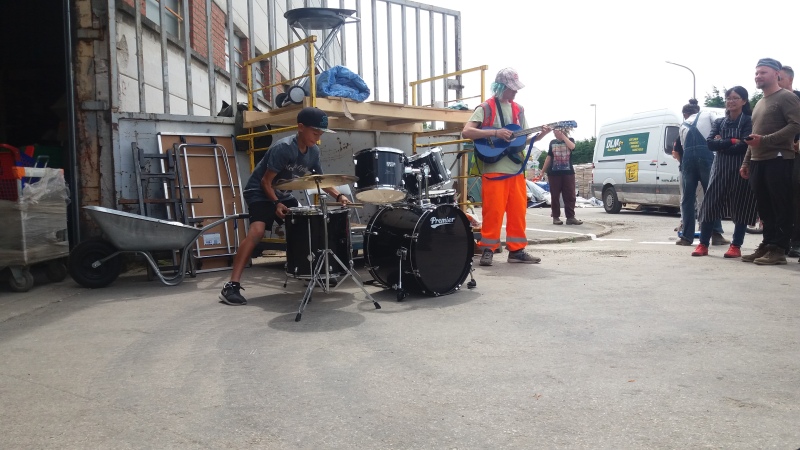
Aidan on drums
While I’m gone lunch arrives on the bus, provided by the warehouse kitchen, which, for the first time I’m aware of, turns out to be a meat dish. Caroline’s on the salad again.
The money transfer mission ends up aborted and I go back out to the bus. The baby wipes have run out, a woman who needs some is angry because there are never any left when she comes to get some. We calm her down by telling her to come back in an hour and I go to get more from the warehouse. As I leave I’m waylaid by two Ethiopian women – could I take them to the train station? It’s not on the way but I know from experience it will take them an hour to walk there so I agree. They are getting the train to one of the other French camps – they’ve been there before, and come back to the Jungle, but are now returning. There seems to be quite a lot of camp hopping going on and we’re not sure why – sometimes to visit other family members, or perhaps just to relieve the boredom.
I’ve been in and out of camp all day but each time the CRS insist on seeing my vehicle pass and driving licence and looking in the back of the car before waving me in reluctantly. Back on the bus, the woman gets her wipes and advice to come earlier in the future. A man comes to the bus door to say that his wife has just given birth, she needs clothes for the baby. We don’t have any here, and again he starts to get angry, but we make a note of his name and promise to bring what she needs the next day. Life here is a continual cycle of frustration and waiting.
Of course we are fortunate enough to be able to leave, and at the end of the day we decide to go into Calais to the Family Pub, catch the end of the Wimbledon final and get an early meal that doesn’t consist of salad. Then it’s back to the campsite and out to the bar for the football, which is of course full of folk with French flags painted on their faces singing the Marseillaise. The guy from the previous night asks us if we have been to the Jungle today – were the refugees aggressive, because they always seem to be aggressive when the French news cameras are there? We tell him about our day and show him the pictures we have taken – the sight of those dead rats perhaps gives him a bit of a different perspective, and his aunt who is with him thinks we are doing a good thing. The mood is more downbeat however once France lose the match and we make a quick exit at the end.
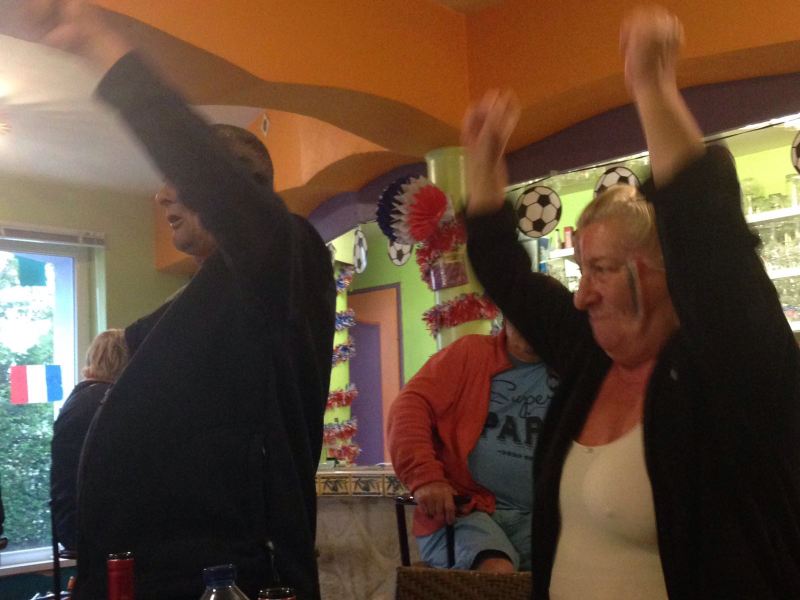
After a poor night’s sleep due to gales battering the tent, we pack up then meet the guy from the Refugee Information Bus and continue our conversation about how to get useful information across to residents of the camp. Perhaps we can get refugees who have settled in Sheffield to come out and advise in appropriate languages; start to link in more effectively with the growing networks for refugee support in the UK. Plenty of food for thought once we are back home.
After an interminable wait for the campsite owner to get over his hangover and return my passport, we drop off a volunteer at the women and children’s bus then spend our last couple of hours at the warehouse making up food parcels, before heading for the ferry and home. On our way we drop off the refugee family’s belongings with their friend and text to say we hope to see them in the UK – we get a text back saying “We hope so too”.
We are still waiting to hear if they have made it. And waiting to find out what the implications of Brexit will be on the camp and border – if the Mayor of Calais has her way, the camp will soon be closed down. Waiting for politicians to stop backstabbing in order to save their careers and put forward some ideas for handling the migration crisis (there are honourable exceptions of course). But at least we don’t have to wait to know whether we will ever see our families again, or have a proper home again. And we have plenty to do, trying to ensure that aid and volunteers keep flowing to Calais, Dunkirk and beyond, and building the networks to support refugees here in the UK.
Thanks to Fran for this report and for the pics
You can read accounts of previous solidarity trips to Calais and Grande Synthe camps here
You can donate to Calais and Grande Synthe here
Your support is needed more than ever

